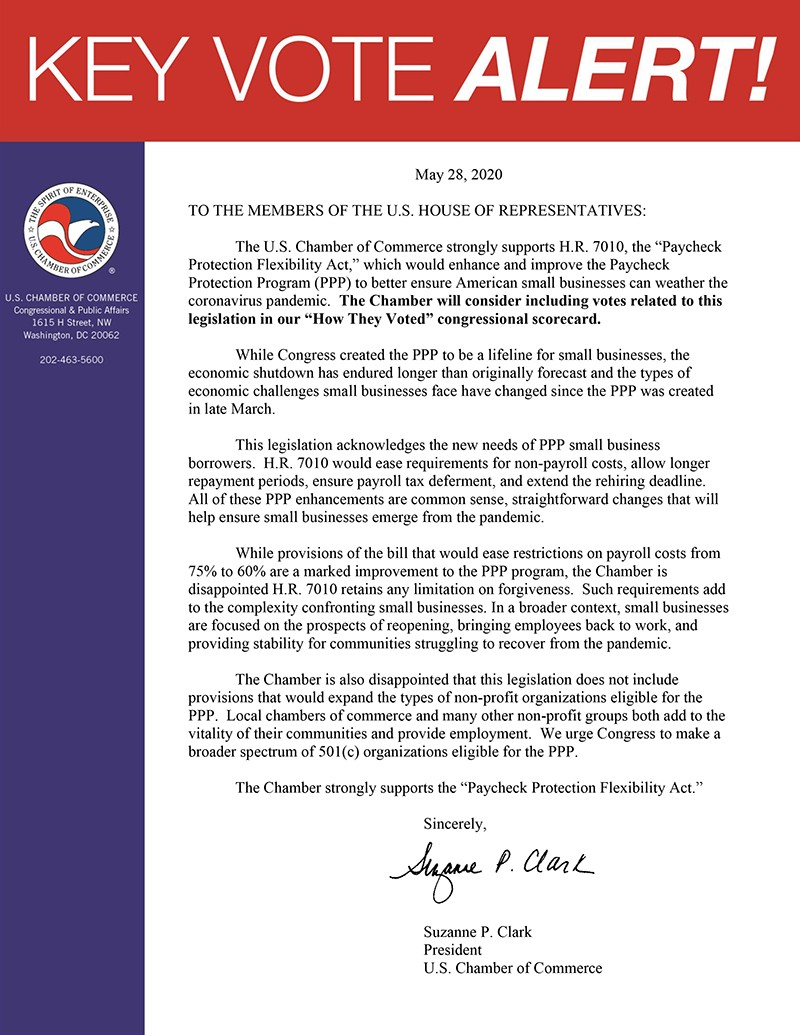USCC: House Passes Bill to Ease Small Business Emergency Loan Rules
USCC: House Passes Bill to Ease Small Business Emergency Loan Rules | Good Evening Chamber Friends,
FYI – Yesterday, the House passed H.R. 7010, the Paycheck Protection Program Flexibility Act on a vote of 417-1. This bill makes the following changes to the Paycheck Protection Program:
- Extends the loan term from 8 weeks to 24 weeks;
- Lowers the percentage of loan proceeds that must be used on payroll from 75% to 60%; and
- Extends the PPP from June 30th to Dec. 31, 2020.
Unfortunately, it does not expand the program to 501(c)(6) non-profits. We will continue to push to make this change as Congress takes up the Phase Four bill later this month
H.R. 7010 must now pass the Senate. Additionally, attached is the Key Vote letter that the U.S. Chamber sent in support of this bill.
-Moore, Clark and Brince
House passes bill to ease small business emergency loan rules
https://www.politico.com/news/2020/05/28/small-business-loan-pandemic-287569
05/28/2020 01:36 PM EDT
Updated: 05/28/2020 03:17 PM EDT
The House on Thursday passed legislation in a nearly unanimous vote that would relax restrictions on emergency government-backed loans designed to avoid mass layoffs at small businesses, a major restructuring of the popular aid program.
The bill the House approved in a 417-1 vote would give borrowers under the $670 billion Paycheck Protection Program more leeway in how they can use the funds and still have the loans forgiven in exchange for maintaining their payrolls.
The forgiveness element was a key incentive Congress created for small businesses to take on the debt and keep paying workers during the pandemic. In the weeks since the program’s launch, many employers have complained that restrictions imposed on the money threatened their ability to secure loan forgiveness, since many are more burdened by overhead costs than payroll.
The legislation, sponsored by Reps. Dean Phillips (D-Minn.) and Chip Roy (R-Texas), would give businesses seeking full loan forgiveness more time to spend the money — 24 weeks instead of eight — and lower the minimum amount that must be spent on payroll to 60 percent instead of 75 percent.
“This will give America’s small businesses the flexibility to ensure they at least have a chance to survive,” said Rep. Steve Chabot of Ohio, the top Republican on the House Small Business Committee.
The vote will put pressure on the Senate to act in the coming days. A bipartisan group of senators last week agreed to a narrower set of flexibility measures but was unable to secure unanimous consent to pass the bill before leaving for Memorial Day recess. The Senate will return to Washington Monday. Senate Minority Leader Chuck Schumer (D-N.Y.) supports the House-passed bill and will move to put it on the floor next week, Schumer spokesperson Justin Goodman said.
Lawmakers are treating the issue with increasing urgency because businesses will soon enter the phase where they will apply for loan forgiveness.
“We’ve got basically a two-week window here to make any reasonable reforms to the forgiveness side,” said Paul Merski, group vice president for congressional relations at the Independent Community Bankers of America.
The House legislation underscored the fluid implementation of the small business loan program, which was hurriedly launched on April 3 and has undergone a series of administrative changes since then to respond to an outcry from businesses that it wasn’t working properly.
Still, the program has proven to be hugely popular, with an initial tranche of funding being depleted in mid-April before Congress replenished it with new funding. As of Wednesday afternoon, the program had approved $510.5 billion via 4.4 million loans and had more than $100 billion in appropriations remaining.
House passage of the bill marked a shift for Speaker Nancy Pelosi, who had previously focused on drafting more comprehensive aid legislation during the pandemic. The House earlier this month passed a $3 trillion relief package that was immediately seen as dead on arrival in the Republican-led Senate.
The House passed Thursday’s Paycheck Protection Program revamp after Democrats scaled back an initial version of the bill to address complaints from labor leaders that it would have given businesses less incentive to hire back workers. The previous draft would have eliminated a minimum payroll spending requirement altogether under the loan forgiveness rules. Instead, House lawmakers decided to just lower the 75 percent spending requirement set by the Small Business Administration and the Treasury Department.
In addition to responding to widespread complaints that the program’s rules were too rigid, House Democrats on Thursday tried unsuccessfully to pass a bill addressing concerns that the Trump administration has released no information on the individual recipients of the aid.
Republicans blocked passage of the legislation. They were able to do so because it required a two-thirds majority to pass under rules for passing bills on an expedited basis.
The bill would have required the SBA to identify businesses that received $2 million or more in Paycheck Protection Program loans and assistance under the Economic Injury Disaster Loan Program. Republicans argued that reporting requirements in the bill would have been too burdensome for small businesses, and they didn’t want to possibly shame law-abiding borrowers that took on the larger loans.
To ensure loans are reaching businesses most in need, the SBA announced it was setting aside $10 billion of Paycheck Protection Program funding to be lent exclusively by Community Development Financial Institutions, which focus on serving underserved populations. The move followed demands by Pelosi and Schumer that the administration carve out funds for community lenders and minority banks.
“Community Development Financial Institutions are a lifeline to so many traditionally underserved and underbanked communities,” Schumer said in a statement. “I want to thank [Treasury Secretary Steven Mnuchin] for heeding our calls to set aside a pool of funding specifically designated for lending by CDFIs, and now we’re urging him to move on and include Minority Depository Institutions as well since they, too, are critical to expanding access to communities of color.”

